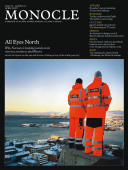
Issue 2
All Eyes North: Why Norway is keeping watch on its reserves, resources and Russia. Monocle reports on the ups and downs of being on top of the world.
In This Issue
Oops! No content was found.
Looks like we no longer have content for the page you're on. Perhaps try a search?
Return Home

